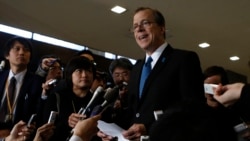“I want to report a strong convergence of views on North Korea,” U.S. Special Representative for North Korea Policy Ambassador Glyn Davies said recently to the press in Tokyo, Japan, as he wrapped up a week of productive consultations in Beijing, Seoul, and Tokyo on a wide range of issues related to North Korea.
Ambassador Davies emphasized that “there is unanimity on what North Korea must do: North Korea must abandon its nuclear weapons and agree to begin that process.”
The international community is looking for concrete actions from Pyongyang to comply with its international obligations and abide by its commitments, including to denuclearize.
“North Korea, however, is moving in the opposite direction,” Ambassador Davies said. In recent months, “we have heard them say repeatedly that instead they demand acceptance as a nuclear weapons state, that they demand prior lifting of sanctions, that they demand a weakening of the U.S. - Republic of Korea alliance, which has kept the peace on the Korean Peninsula now for 60 years.”
“I also want to underscore that Pyongyang’s attempts to engage in dialogue while keeping its program running are completely unacceptable,” Ambassador Davies continued.
“After so many broken promises, after the nuclear and missile tests, the threats against its neighbors and the United States, that not just its negotiating partners in the Six-Party-Talks process, but the international community writ large, would [need] high standards of evidence to measure North Korean intentions.”
“The United States and its allies call on North Korea to… take concrete steps to demonstrate its seriousness of purpose” with respect to denuclearization, Ambassador Davies said. “We will continue this process of joining with our partners ... to keep the onus for action on North Korea.”
Ambassador Davies emphasized that “there is unanimity on what North Korea must do: North Korea must abandon its nuclear weapons and agree to begin that process.”
The international community is looking for concrete actions from Pyongyang to comply with its international obligations and abide by its commitments, including to denuclearize.
“North Korea, however, is moving in the opposite direction,” Ambassador Davies said. In recent months, “we have heard them say repeatedly that instead they demand acceptance as a nuclear weapons state, that they demand prior lifting of sanctions, that they demand a weakening of the U.S. - Republic of Korea alliance, which has kept the peace on the Korean Peninsula now for 60 years.”
“I also want to underscore that Pyongyang’s attempts to engage in dialogue while keeping its program running are completely unacceptable,” Ambassador Davies continued.
“After so many broken promises, after the nuclear and missile tests, the threats against its neighbors and the United States, that not just its negotiating partners in the Six-Party-Talks process, but the international community writ large, would [need] high standards of evidence to measure North Korean intentions.”
“The United States and its allies call on North Korea to… take concrete steps to demonstrate its seriousness of purpose” with respect to denuclearization, Ambassador Davies said. “We will continue this process of joining with our partners ... to keep the onus for action on North Korea.”






